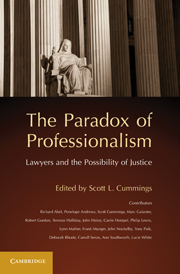Book contents
- Frontmatter
- Contents
- List of Tables and Figures
- Contributors
- Preface and Acknowledgments
- 1 Introduction
- PART I LAWYERS AND THE PUBLIC GOOD: THE FUNDAMENTAL DILEMMA
- PART II LAWYERS AND THEIR CLIENTS: DETERMINANTS OF ETHICAL PRACTICE
- PART III LAWYERS AND SOCIAL CHANGE: MOBILIZING LAW FOR JUSTICE
- 14 Epilogue
- Index
Preface and Acknowledgments
Published online by Cambridge University Press: 05 June 2012
- Frontmatter
- Contents
- List of Tables and Figures
- Contributors
- Preface and Acknowledgments
- 1 Introduction
- PART I LAWYERS AND THE PUBLIC GOOD: THE FUNDAMENTAL DILEMMA
- PART II LAWYERS AND THEIR CLIENTS: DETERMINANTS OF ETHICAL PRACTICE
- PART III LAWYERS AND SOCIAL CHANGE: MOBILIZING LAW FOR JUSTICE
- 14 Epilogue
- Index
Summary
This book is a testament to the power of one person to make a difference. It grew out of a conference in September 2009 honoring the extraordinary legacy of Richard L. Abel, whose field-defining work on the legal profession has been a gift to all of us who care deeply about law as an instrument of justice. Abel's career has spanned – and helped define – the trajectory of contemporary sociolegal thought. He was a founding member of the law-and-society movement, editor of the Law & Society Review, and president of the Law and Society Association, which in 1989 bestowed on him its prestigious Harry J. Kalven Prize honoring the powerful impact of his overall body of scholarly work. He participated in the founding conference on Critical Legal Studies and helped organize the meeting on “Law and Racism: The Sounds of Silence,” which contributed to the development of Critical Race Theory. His scholarly influence is broad, spanning the legal profession, disputing, law and social change, and torts. He is perhaps best known for fundamentally reshaping our understanding of the role of lawyers in society – focusing attention on their collective quest for power while also highlighting their individual struggles to redistribute it. It is this paradox at the heart of lawyers' “professional project” that is explored in this volume.
- Type
- Chapter
- Information
- The Paradox of ProfessionalismLawyers and the Possibility of Justice, pp. xi - xiiPublisher: Cambridge University PressPrint publication year: 2011

